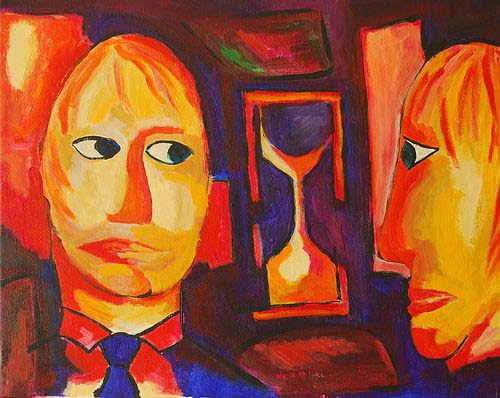What is A Midlife Crisis? What is a Transition to Later Life?

Well, what is a midlife crisis? Could you possibly be having one now? Or, is something else important unfolding in your life?

The standard image of a midlife crisis has certainly made its way into the media and the popular psyche. It’s a pretty stereotypical, almost cartoon-ish image! It has a lot to do with middle-aged males leaving their wives for much younger women, and zipping around town in newly purchased flashy red sports cars. Some people do have midlife experiences of this type. Yet, it’s important to cast our net much more widely if we want to understand the kinds of transitions that people undergo at midlife — and later in the second half of life.
Firstly, it’s not just males who go through major life transitions in the middle of life. Far from it! Females are just as likely to enter a period of real questioning and soul-searching as a part of midlife transition. Males and females alike often fully realize in midlife that life doesn’t last forever, and feel that that puts particular emphasis on what each of us chooses to do with the rest of life.
What’s more, the particular challenges of the middle of life, and the second half of life have a way of being very individual. We can see the first half of life for many people as very much being about living in a way that meets the broad expectations of family, peer groups, or society as a whole. The second half of life is very much about finding things in life that hold value specifically for me. So, the particular way that these issues come up for each person in a “midlife crisis” or midlife transition vary so enormously that we always have to ask, “What kind of a ‘midlife crisis’ is this individual having?
What is a Midlife Crisis — for Me?
Each of us has to ask ourselves how the previously unacknowledged parts of ourselves are confronting us as we move into, or through, the second half of life.
One person may find that issues around career are bringing up deep questions about what is meaningful or worth doing in life. Another may find him- or herself asking important questions about key relationships with a partner or a spouse. Someone else may find that they are going through significant changes in their ethical, spiritual or religious orientation. Others may find that they are strongly attracted to some new interest that seems even “out of character” with the way that they have thought of themselves to this point in their lives.
In my own case, at one point in my midlife journey, it was pretty much a blend of “all of the above.” Your experience will differ — as it does from individual to individual. As Jungian analyst James Hollis tells us,
When one has let go of that great hidden agenda that drives humanity and its varied histories, then one can begin to encounter the immensity of one’s own soul.
James Hollis, The Eden Project
It’s important to recognize that any and all of these experiences may also be accompanied by the experience of anxiety and/or depression. The presence of anxiety or depression may well be one of the things that alerts us to the fact that we are going through the transition into the second half of life.
Business as Usual? —Probably Not An Option
There’s a psychological liability in trying to ignore the inner voices that may come up in the middle of life. It can be very tempting to simply pretend that everything in our lives is just as it always was — even though at the deepest level, we know that it isn’t. Hollis speaks of this inertia in us in the context of spirituality:
In moments of spiritual crisis we naturally fall back upon what worked for us, or seemed to work, heretofore. Sometimes this shows up through the reassertion of our old values in belligerent, testy ways. Regression of any kind is just such a return…
James Hollis, What Matters Most
Often we can try to simply ignore the reality of what is happening in mid-life. However, it’s not likely that we’ll be able to feel that life is flowing for us, and moving beyond stagnation, unless we take changing realities seriously.
Your Unique Journey
The process of uncovering the personal meaning of these changes will involve creative disruption. Moving in the direction of living out our own uniqueness is the only life-giving way through these challenges. Hollis puts it in perspective for us:
We are not here to fit in, be well balanced, or provide [examples] for others. We are here to be eccentric, different, perhaps strange, perhaps merely to add our small piece, our little clunky, chunky selves, to the great mosaic of being. As the gods intended, we are here to become more and more ourselves.
Hollis, What Matters Most
It’s only when we’re on the road to our own individual selves, our own particular, unique sense of what is meaningful in our lives, that we can find any lasting sense of value in our lives. It’s essential to commit ourselves to trying to understand ourselves as we emerge, and to discern what begins to call to us, as we journey into the second half of our lives. Jungian /a-midlife-transition may well prove to be an invaluable aid on this journey towards wholeness.
